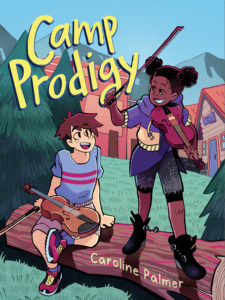“Peer Tutoring, Musical and Otherwise”
As far as I’ve heard, peer tutoring is typically intended to be the most beneficial for one person–the one being tutored. In contrast, while the tutor themselves may receive extra credit in a class, or some pocket change, they ultimately don’t learn anything new. Or at least, that’s how it seems. In reality, the few times I’ve been asked to explain a concept to one of my classmates, I’ve always walked away from the encounter feeling more assured in my knowledge and aware of the weaknesses I need to build up. Peer tutoring is much more reciprocal than most people assume!
When it comes to older tutors, the balance is naturally lopsided. One party is experienced and well versed in the topics of choice, and the other is not. With peer tutors, however, the participants are on equal footing. Both must work together to come up with answers to their questions. And being closer in age to your collaborator makes it easier to understand one another. Who can better explain a concept in a way that makes sense than someone on your level?
In high school, I took an orchestra class every year. It was a very collaborative environment! Something that stood out to me was a type of practice called sectionals. You and your peers who played the same specific instrument would group together for a set amount of time to make progress on the music you were learning. The head of the group–the one who sits in front–leads the sectional. I was first given this duty around 9th grade, and I remember being intimidated at the thought of having to take a leadership position, having to talk to people I didn’t know well, and having to instruct peers who were older than me. I’m sure that the first sectional I led was rough, but with practice, I was able to get used to and even enjoy the responsibility. Aside from helping my peers learn, I was also able to better identify the skills I needed to improve.
And apart from being educational, peer tutoring is a great chance to build interpersonal relationships. I became a better musician when I led those sectionals, and also, I grew as a person. I was able to become closer to my peers, despite how shy I tended to be in school. All of us were able to trust each other–they could trust that I would offer them helpful and clear advice, and I could trust that they’d point out places in the music where we all needed to agree on the best way to play. In addition to strengthening our friendships, this sort of peer tutoring also strengthened my self-confidence. If I hadn’t been pushed to lead, I might not have done as well in orchestra as I did, and I certainly would’ve been far less social with the rest of the class.
I can imagine that there are plenty of kids in schools who would be less than enthused at the chance to teach their peers. Whether because they see it as a waste of time, they doubt their own expertise in the subject matter, or they’re awkward talking to those they don’t know well–like I was. Still, I’d say that they should give it a shot. Sometimes, you have to push through the discomfort for a while to reap the benefits.
Tutor or tutee, if they still struggle with the material after doing their best, at least they might have a new friend willing to help them through it.
Published June 11th, 2024 by Atheneum Books for Young Readers
About the Book: Perfect for fans of Victoria Jamieson and Raina Telgemeier, this heartwarming middle grade graphic novel follows two nonbinary kids who navigate anxiety and identity while having fun and forming friendships at their summer orchestra camp.
After attending an incredible concert, Tate Seong is inspired to become a professional violist. There’s just one problem: they’re the worst musician at their school.
Tate doesn’t even have enough confidence to assert themself with their friends or come out as nonbinary to their family, let alone attempt a solo anytime soon. Things start to look up when Tate attends a summer orchestra camp—Camp Prodigy—and runs into Eli, the remarkable violist who inspired Tate to play in the first place.
But Eli has been hiding their skills ever since their time in the spotlight gave them a nervous breakdown. Together, can they figure out how to turn Tate into a star and have Eli overcome their performance anxieties? Or will the pressure take them both down?
About the Author: Caroline Palmer (they/them) is a nonbinary comic creator. Their work has been published in the comics anthology, A Taste of Home (2020) by Level Ground Comics, and they’ve been consistently updating their Webtoon Talent de Lune since 2016.
Thank you, Caroline, for reminding us to allow peers to collaborate and educate!



1 thought on “Author Guest Post: “Peer Tutoring, Musical and Otherwise” by Caroline Palmer, Author of Camp Prodigy”